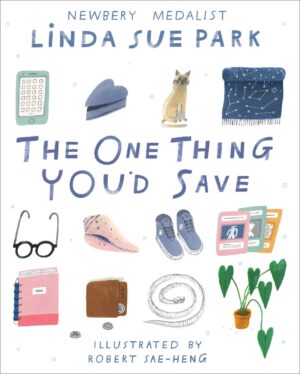
“Imagine that your home is on fire. You’re allowed to save one thing. Your family and pets are safe, so don’t worry about them. Your Most Important Thing. Any size.”
In her thought-provoking verse novel, The One Thing You’d Save, Newbery Award winning author Linda Sue Park has Ms. Chang’s middle school students consider, discuss, respond to, and change their minds about this hypothetical scenario.
Some of Ms. Chang’s students pick practical items like a cell phone (“Somebody’s gotta call 9-1-1, right?”), money (“My Dad’s wallet, duh.”), a rug (for STOP, DROP and ROLL), and an insulin kit (“—Mom forgets”).
Others choose sentimental items: a sweater knitted then re-knitted by two grandmothers, a worked-hard-for science fair award, “the coolest sneakers on the planet” (“I put those babies on my feet, it’s like, see ya later, fire.”), a baseball game program, a sketch book, a collection of animal figurines, books, or trading cards. Sadly, one student says he would “walk out with nothing. Not a dang thing . . . the place is a total dump . . . Be glad to see it burn down.”
I admire the conversation this assignment fosters in Ms. Chang’s class and imagine the conversations this book can spark in other classrooms and beyond.
While visiting my family last month, I posed the question to the adults: What’s the one thing you’d save?
The bottom line seemed to be, if family and pets are all safe, not much else matters. As my cousin Larry said, “I couldn’t really think of anything that was truly important to me once I knew we were okay.” All agreed they would probably regret losing some things but, as cousin Ronnie said, we’d “get over it.” My brother Billie said he would rather just walk out and let everything burn, but not for the same reason as the student in Park’s book. If he just saved one thing, he might second guess himself later, maybe wish he’d saved something else. He’d rather just lose it all.
There was some discussion about practical items (important documents, cell phone, spare keys, laptop) and like Ms. Chang’s students, some stretched “one thing” a bit. Purses were popular. My sister Regina (who was a Girl Scout and lives by the motto “be prepared”) chose her already packed ‘go bag’ which contains everything she might need in the aftermath of an emergency.
Some considered the sentimental and irreplaceable: My sister Renee chose photographs of our parents though she considered Mom’s wedding rings. My sister-in-law Donna would save her journals to share the things she would like her children to know — her prayers, aspirations and unconditional love for them.
I’ve been back and forth on the question. My first thought was to save the box of my dad’s poems or the one letter I received from my grampap years ago. My practical side reminded me that my current writing projects are in my laptop . . . I would lose all my work. So what do I do? It is hard to choose, but I love the discussion this question sparks.
As my cousin Cindy said, in a real emergency “we panic and don’t focus on what’s really precious to us” until afterwards when it’s too late. “This was really a good thing for us to think about.”
I agree. In fact, I’m thinking I should scan Grampap’s letter, Dad’s poems, and some other documents to increase the odds of preserving them.
The One Thing You’d Save is an engaging read aloud that provokes critical thinking, laughter, pain, and heartfelt emotion. Thank you, Linda Sue.
